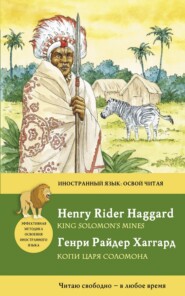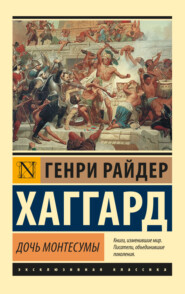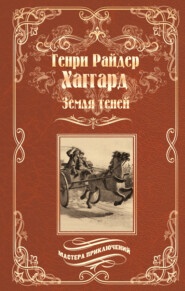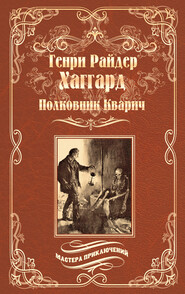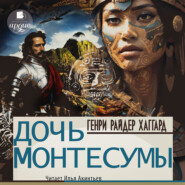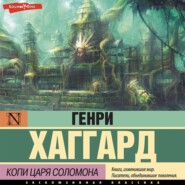По всем вопросам обращайтесь на: info@litportal.ru
(©) 2003-2024.
✖
The World's Desire
Настройки чтения
Размер шрифта
Высота строк
Поля
To the golden sun:
Though we wander alone, unknowing, —
Oh, heart of mine, —
The path of the strange sea-going,
Of the blood-red brine;
Yet endure! We shall not be shaken
By things worse than these;
We have ‘scaped, when our friends were taken,
On the unsailed seas;
Worse deaths have we faced and fled from,
In the Cyclops’ den,
When the floor of his cave ran red from
The blood of men;
Worse griefs have we known undaunted,
Worse fates have fled;
When the Isle that our long love haunted
Lay waste and dead!
So he was chanting when he descried, faint and far off, a red glow cast up along the darkness like sunset on the sky of the Under-world. For this light he steered, and soon he saw two tall pillars of flame blazing beside each other, with a narrow space of night between them. He helmed the ship towards these, and when he came near them they were like two mighty mountains of wood burning far into heaven, and each was lofty as the pyre that blazes over men slain in some red war, and each pile roared and flared above a steep crag of smooth black basalt, and between the burning mounds of fire lay the flame-flecked water of a haven.
The ship neared the haven and the Wanderer saw, moving like fireflies through the night, the lanterns in the prows of boats, and from one of the boats a sailor hailed him in the speech of the people of Egypt, asking him if he desired a pilot.
“Yea,” he shouted. The boat drew near, and the pilot came aboard, a torch in his hand; but when his eyes fell on the dead men in the ship, and the horror hanging from the yard, and the captain bound to the iron bar, and above all, on the golden armour of the hero, and on the spear-point fast in his helm, and on his terrible face, he shrank back in dread, as if the God Osiris himself, in the Ship of Death, had reached the harbour. But the Wanderer bade him have no fear, telling him that he came with much wealth and with a great gift for the Pharaoh. The pilot, therefore, plucked up heart, and took the helm, and between the two great hills of blazing fire the vessel glided into the smooth waters of the River of Egypt, the flames glittering on the Wanderer’s mail as he stood by the mast and chanted the Song of the Bow.
Then, by the counsel of the pilot, the vessel was steered up the river towards the Temple of Heracles in Tanis, where there is a sanctuary for strangers, and where no man may harm them. But first, the dead Sidonians were cast overboard into the great river, for the dead bodies of men are an abomination to the Egyptians. And as each body struck the water the Wanderer saw a hateful sight, for the face of the river was lashed into foam by the sudden leaping and rushing of huge four-footed fish, or so the Wanderer deemed them. The sound of the heavy plunging of the great water-beasts, as they darted forth on the prey, smiting at each other with their tails, and the gnashing of their jaws when they bit too eagerly, and only harmed the air, and the leap of a greedy sharp snout from the waves, even before the dead man cast from the ship had quite touched the water – these things were horrible to see and hear through the blackness and by the firelight. A River of Death it seemed, haunted by the horrors that are said to prey upon the souls and bodies of the Dead. For the first time the heart of the Wanderer died within him, at the horror of the darkness and of this dread river and of the water-beasts that dwelt within it. Then he remembered how the birds had fled in terror from this place, and he bethought him of the blood-red sea.
When the dead men were all cast overboard and the river was once more still, the Wanderer spoke, sick at heart, and inquired of the pilot why the sea had run so red, and whether war was in the land, and why there was night over all that country. The fellow answered that there was no war, but peace, yet the land was strangely plagued with frogs and locusts and lice in all their coasts, the sacred river Sihor running red for three whole days, and now, at last, for this the third day, darkness over all the world. But as to the cause of these curses the pilot knew nothing, being a plain man. Only the story went among the people that the Gods were angry with Khem (as they call Egypt), which indeed was easy to see, for those things could come only from the Gods. But why they were angered the pilot knew not, still it was commonly thought that the Divine Hathor, the Goddess of Love, was wroth because of the worship given in Tanis to one they called THE STRANGE HATHOR, a goddess or a woman of wonderful beauty, whose Temple was in Tanis. Concerning her the pilot said that many years ago, some thirty years, she had first appeared in the country, coming none knew whence, and had been worshipped in Tanis, and had again departed as mysteriously as she came. But now she had once more chosen to appear visible to men, strangely, and to dwell in her temple; and the men who beheld her could do nothing but worship her for her beauty. Whether she was a mortal woman or a goddess the pilot did not know, only he thought that she who dwells in Atarhechis, Hathor of Khem, the Queen of Love, was angry with the strange Hathor, and had sent the darkness and the plagues to punish them who worshipped her. The people of the seaboard also murmured that it would be well to pray the Strange Hathor to depart out of their coasts, if she were a goddess; and if she were a woman to stone her with stones. But the people of Tanis vowed that they would rather die, one and all, than do aught but adore the incomparable beauty of their strange Goddess. Others again, held that two wizards, leaders of certain slaves of a strange race, wanderers from the desert, settled in Tanis, whom they called the Apura, caused all these sorrows by art-magic. As if, forsooth, said the pilot, those barbarian slaves were more powerful than all the priests of Egypt. But for his part, the pilot knew nothing, only that if the Divine Hathor were angry with the people of Tanis it was hard that she must plague all the land of Khem.
So the pilot murmured, and his tale was none of the shortest; but even as he spoke the darkness grew less dark and the cloud lifted a little so that the shores of the river might be seen in a green light like the light of Hades, and presently the night was rolled up like a veil, and it was living noonday in the land of Khem. Then all the noise of life broke forth in one moment, the kine lowing, the wind swaying the feathery palms, the fish splashing in the stream, men crying to each other from the river banks, and the voice of multitudes of people in every red temple praising Ra, their great God, whose dwelling is the Sun. The Wanderer, too, praised his own Gods, and gave thanks to Apollo, and to Helios Hyperion, and to Aphrodite. And in the end the pilot brought the ship to the quay of a great city, and there a crew of oarsmen was hired, and they sped rejoicing in the sunlight, through a canal dug by the hands of men, to Tanis and the Sanctuary of Heracles, the Safety of Strangers. There the ship was moored, there the Wanderer rested, having a good welcome from the shaven priests of the temple.
V MERIAMUN THE QUEEN
Strange news flies fast. It was not long before the Pharaoh, who then was with his Court in Tanis, the newly rebuilded city, heard how there had come to Khem a man like a god, wearing golden armour, and cruising alone in a ship of the dead. In these years the white barbarians of the sea and of the isles were wont to land in Egypt, to ravage the fields, carry women captive, and fly again in their ships. But not one of them had dared to sail in the armour of the Aquaiusha, as the Egyptians named the Achæans, right up the river to the city of Pharaoh. The King, therefore, was amazed at the story, and when he heard that the stranger had taken sanctuary in the Temple of Heracles, he sent instantly for his chief counsellor. This was his Master Builder, who bore a high title in the land, an ancient priest named Rei. He had served through the long reign of the King’s father, the divine Rameses the Second, and he was beloved both of Meneptah and of Meriamun his Queen. Him the King charged to visit the Sanctuary and bring the stranger before him. So Rei called for his mule, and rode down to the Temple of Heracles beyond the walls.
When Rei came thither, a priest went before him and led him to the chamber where the warrior chanced to be eating the lily bread of the land, and drinking the wine of the Delta. He rose as Rei entered, and he was still clad in his golden armour, for as yet he had not any change of raiment. Beside him, on a bronze tripod, lay his helmet, the Achæan helmet, with its two horns and with the bronze spear-point still fast in the gold.
The eyes of Rei the Priest fell on the helmet, and he gazed so strangely at it that he scarcely heard the Wanderer’s salutation. At length he answered, courteously, but always his eyes wandered back to the broken spear-point.
“Is this thine, my son?” he asked, taking it in his hand, while his voice trembled.
“It is my own,” said the Wanderer, “though the spear-point in it was lent me of late, in return for arrows not a few and certain sword-strokes,” and he smiled.
The ancient priest bade the Temple servants retire, and as they went they heard him murmuring a prayer.
“The Dead spoke truth,” he muttered, still gazing from the helmet in his hand to the Wanderer; “ay, the Dead speak seldom, but they never lie.”
“My son, thou hast eaten and drunk,” then said Rei the Priest and Master Builder, “and may an old man ask whence thou camest, where is thy native city, and who are thy parents?”
“I come from Alybas,” answered the Wanderer, for his own name was too widely known, and he loved an artful tale. “I come from Alybas; I am the son of Apheidas, son of Polypemon, and my own name is Eperitus.”
“And wherefore comest thou here alone in a ship of dead men, and with more treasure than a king’s ransom?”
“It was men of Sidon who laboured and died for all that cargo,” said the Wanderer; “they voyaged far for it, and toiled hard, but they lost it in an hour. For they were not content with what they had, but made me a prisoner as I lay asleep on the coast of Crete. But the Gods gave me the upper hand of them, and I bring their captain, and much white metal and many swords and cups and beautiful woven stuffs, as a gift to your King. And for thy courtesy, come with me, and choose a gift for thyself.”
Then he led the old man to the treasure-chambers of the Temple, which was rich in the offerings of many travellers, gold and turquoise and frankincense from Sinai and Punt, great horns of carved ivory from the unknown East and South; bowls and baths of silver from the Khita, who were the allies of Egypt. But amidst all the wealth, the stranger’s cargo made a goodly show, and the old priest’s eyes glittered as he looked at it.
“Take thy choice, I pray thee,” said the Wanderer, “the spoils of foemen are the share of friends.”
The priest would have refused, but the Wanderer saw that he looked ever at a bowl of transparent amber, from the far-off Northern seas, that was embossed with curious figures of men and gods, and huge fishes, such as are unknown in the Midland waters. The Wanderer put it into the hands of Rei.
“Thou shalt keep this,” he said, “and pledge me in wine from it when I am gone, in memory of a friend and a guest.”
Rei took the bowl, and thanked him, holding it up to the light to admire the golden colour.
“We are always children,” he said, smiling gravely. “See an old child whom thou hast made happy with a toy. But we are men too soon again; the King bids thee come with me before him. And, my son, if thou wouldst please me more than by any gift, I pray thee pluck that spear-head from thy helmet before thou comest into the presence of the Queen.”
“Pardon me,” said the Wanderer. “I would not harm my helmet by tearing it roughly out, and I have no smith’s tools here. The spear-point, my father, is a witness to the truth of my tale, and for one day more, or two, I must wear it.”
Rei sighed, bowed his head, folded his hands, and prayed to his God Amen, saying:
“O Amen, in whose hand is the end of a matter, lighten the burden of these sorrows, and let the vision be easy of accomplishment, and I pray thee, O Amen, let thy hand be light on thy daughter Meriamun, the Lady of Khem.”
Then the old man led the Wanderer out, and bade the priests make ready a chariot for him; and so they went through Tanis to the Court of Meneptah. Behind them followed the priests, carrying gifts that the Wanderer had chosen from the treasures of the Sidonians, and the miserable captain of the Sidonians was dragged along after them, bound to the hinder part of a chariot. Through the gazing crowd they all passed on to the Hall of Audience, where, between the great pillars, sat Pharaoh on his golden throne. Beside him, at his right hand, was Meriamun, the beautiful Queen, who looked at the priests with weary eyes, as if at a matter in which she had no concern. They came in and beat the earth with their brows before the King. First came the officers, leading the captain of the Sidonians for a gift to Pharaoh, and the King smiled graciously and accepted the slave.
Then came others, bearing the cups of gold fashioned like the heads of lions and rams, and the swords with pictures of wars and huntings echoed on their blades in many-coloured gold, and the necklets of amber from the North, which the Wanderer had chosen as gifts for Pharaoh’s Queen and Pharaoh. He had silks, too, embroidered in gold, and needlework of Sidonian women, and all these the Queen Meriamun touched to show her acceptance of them, and smiled graciously and wearily. But the covetous Sidonian groaned, when he saw his wealth departing from him, the gains for which he had hazarded his life in unsailed seas. Lastly, Pharaoh bade them lead the Wanderer in before his presence, and he came unhelmeted, in all his splendour, the goodliest man that had ever been seen in Khem. He was of no great height, but very great of girth, and of strength unmatched, and with the face of one who had seen what few have seen and lived. The beauty of youth was gone from him, but his face had the comeliness of a warrior tried on sea and land; the eyes were of a valour invincible, and no woman could see him but she longed to be his love.
As he entered murmurs of amazement passed over all the company, and all eyes were fixed on him, save only the weary and wandering eyes of the listless Meriamun. But when she chanced to lift her face, and gaze on him, they who watch the looks of kings and queens saw her turn grey as the dead, and clutch with her hand at her side. Pharaoh himself saw this though he was not quick to mark what passed, and he asked her if anything ailed her, but she answered: —
“Nay, only methinks the air is sick with heat and perfume. Greet thou this stranger.” But beneath her robe her fingers were fretting all the while at the golden fringes of her throne.
“Welcome, thou Wanderer,” cried Pharaoh, in a deep and heavy voice, “welcome! By what name art thou named, and where dwell thy people, and what is thy native land?”
Bowing low before Pharaoh, the Wanderer answered, with a feigned tale, that his name was Eperitus of Alybas, the son of Apheidas. The rest of the story, and how he had been taken by the Sidonians, and how he had smitten them on the seas, he told as he had told it to Rei. And he displayed his helmet with the spear-point fast in it. But when she saw this Meriamun rose to her feet as if she would be gone, and then fell back into her seat even paler than before.
“The Queen, help the Queen, she faints,” cried Rei the Priest, whose eyes had never left her face. One of her ladies, a beautiful woman, ran to her, knelt before her, and chafed her hands, till she came to herself, and sat up with angry eyes.
“Let be!” she said, “and let the slave who tends the incense be beaten on the feet. Nay, I will remain here, I will not to my chamber. Let be!” and her lady drew back afraid.
Then Pharaoh bade men lead the Sidonian out, and slay him in the market-place for his treachery; but the man, whose name was Kurri, threw himself at the feet of the Wanderer, praying for his life. The Wanderer was merciful, when the rage of battle was over, and his blood was cool.
“A boon, O Pharaoh Meneptah,” he cried. “Spare me this man! He saved my own life when the crew would have cast me overboard. Let me pay my debt.”
“Let him be spared, as thou wilt have it so,” spoke Pharaoh, “but revenge dogs the feet of foolish mercy, and many debts are paid ere all is done.”
Thus it chanced that Kurri was given to Meriamun to be her jeweller and to work for her in gold and silver. To the Wanderer was allotted a chamber in the Royal Palace, for the Pharaoh trusted that he would be a leader of his Guard, and took great pleasure in his beauty and his strength.
As he left the Hall of Audience with Rei, the Queen Meriamun lifted her eyes again, and looked on him long, and her ivory face flushed rosy, like the ivory that the Sidonians dye red for the trappings of the horses of kings. But the Wanderer marked both the sudden fear and the blush of Meriamun, and, beautiful as she was, he liked it ill, and his heart foreboded evil. When he was alone with Rei, therefore, he spoke to him of this, and prayed the old man to tell him if he could guess at all the meaning of the Queen.
“For to me,” he said, “it was as if the Lady knew my face, and even as if she feared it; but I never saw her like in all my wanderings. Beautiful she is, and yet – but it is ill speaking in their own land of kings and queens!”
Though we wander alone, unknowing, —
Oh, heart of mine, —
The path of the strange sea-going,
Of the blood-red brine;
Yet endure! We shall not be shaken
By things worse than these;
We have ‘scaped, when our friends were taken,
On the unsailed seas;
Worse deaths have we faced and fled from,
In the Cyclops’ den,
When the floor of his cave ran red from
The blood of men;
Worse griefs have we known undaunted,
Worse fates have fled;
When the Isle that our long love haunted
Lay waste and dead!
So he was chanting when he descried, faint and far off, a red glow cast up along the darkness like sunset on the sky of the Under-world. For this light he steered, and soon he saw two tall pillars of flame blazing beside each other, with a narrow space of night between them. He helmed the ship towards these, and when he came near them they were like two mighty mountains of wood burning far into heaven, and each was lofty as the pyre that blazes over men slain in some red war, and each pile roared and flared above a steep crag of smooth black basalt, and between the burning mounds of fire lay the flame-flecked water of a haven.
The ship neared the haven and the Wanderer saw, moving like fireflies through the night, the lanterns in the prows of boats, and from one of the boats a sailor hailed him in the speech of the people of Egypt, asking him if he desired a pilot.
“Yea,” he shouted. The boat drew near, and the pilot came aboard, a torch in his hand; but when his eyes fell on the dead men in the ship, and the horror hanging from the yard, and the captain bound to the iron bar, and above all, on the golden armour of the hero, and on the spear-point fast in his helm, and on his terrible face, he shrank back in dread, as if the God Osiris himself, in the Ship of Death, had reached the harbour. But the Wanderer bade him have no fear, telling him that he came with much wealth and with a great gift for the Pharaoh. The pilot, therefore, plucked up heart, and took the helm, and between the two great hills of blazing fire the vessel glided into the smooth waters of the River of Egypt, the flames glittering on the Wanderer’s mail as he stood by the mast and chanted the Song of the Bow.
Then, by the counsel of the pilot, the vessel was steered up the river towards the Temple of Heracles in Tanis, where there is a sanctuary for strangers, and where no man may harm them. But first, the dead Sidonians were cast overboard into the great river, for the dead bodies of men are an abomination to the Egyptians. And as each body struck the water the Wanderer saw a hateful sight, for the face of the river was lashed into foam by the sudden leaping and rushing of huge four-footed fish, or so the Wanderer deemed them. The sound of the heavy plunging of the great water-beasts, as they darted forth on the prey, smiting at each other with their tails, and the gnashing of their jaws when they bit too eagerly, and only harmed the air, and the leap of a greedy sharp snout from the waves, even before the dead man cast from the ship had quite touched the water – these things were horrible to see and hear through the blackness and by the firelight. A River of Death it seemed, haunted by the horrors that are said to prey upon the souls and bodies of the Dead. For the first time the heart of the Wanderer died within him, at the horror of the darkness and of this dread river and of the water-beasts that dwelt within it. Then he remembered how the birds had fled in terror from this place, and he bethought him of the blood-red sea.
When the dead men were all cast overboard and the river was once more still, the Wanderer spoke, sick at heart, and inquired of the pilot why the sea had run so red, and whether war was in the land, and why there was night over all that country. The fellow answered that there was no war, but peace, yet the land was strangely plagued with frogs and locusts and lice in all their coasts, the sacred river Sihor running red for three whole days, and now, at last, for this the third day, darkness over all the world. But as to the cause of these curses the pilot knew nothing, being a plain man. Only the story went among the people that the Gods were angry with Khem (as they call Egypt), which indeed was easy to see, for those things could come only from the Gods. But why they were angered the pilot knew not, still it was commonly thought that the Divine Hathor, the Goddess of Love, was wroth because of the worship given in Tanis to one they called THE STRANGE HATHOR, a goddess or a woman of wonderful beauty, whose Temple was in Tanis. Concerning her the pilot said that many years ago, some thirty years, she had first appeared in the country, coming none knew whence, and had been worshipped in Tanis, and had again departed as mysteriously as she came. But now she had once more chosen to appear visible to men, strangely, and to dwell in her temple; and the men who beheld her could do nothing but worship her for her beauty. Whether she was a mortal woman or a goddess the pilot did not know, only he thought that she who dwells in Atarhechis, Hathor of Khem, the Queen of Love, was angry with the strange Hathor, and had sent the darkness and the plagues to punish them who worshipped her. The people of the seaboard also murmured that it would be well to pray the Strange Hathor to depart out of their coasts, if she were a goddess; and if she were a woman to stone her with stones. But the people of Tanis vowed that they would rather die, one and all, than do aught but adore the incomparable beauty of their strange Goddess. Others again, held that two wizards, leaders of certain slaves of a strange race, wanderers from the desert, settled in Tanis, whom they called the Apura, caused all these sorrows by art-magic. As if, forsooth, said the pilot, those barbarian slaves were more powerful than all the priests of Egypt. But for his part, the pilot knew nothing, only that if the Divine Hathor were angry with the people of Tanis it was hard that she must plague all the land of Khem.
So the pilot murmured, and his tale was none of the shortest; but even as he spoke the darkness grew less dark and the cloud lifted a little so that the shores of the river might be seen in a green light like the light of Hades, and presently the night was rolled up like a veil, and it was living noonday in the land of Khem. Then all the noise of life broke forth in one moment, the kine lowing, the wind swaying the feathery palms, the fish splashing in the stream, men crying to each other from the river banks, and the voice of multitudes of people in every red temple praising Ra, their great God, whose dwelling is the Sun. The Wanderer, too, praised his own Gods, and gave thanks to Apollo, and to Helios Hyperion, and to Aphrodite. And in the end the pilot brought the ship to the quay of a great city, and there a crew of oarsmen was hired, and they sped rejoicing in the sunlight, through a canal dug by the hands of men, to Tanis and the Sanctuary of Heracles, the Safety of Strangers. There the ship was moored, there the Wanderer rested, having a good welcome from the shaven priests of the temple.
V MERIAMUN THE QUEEN
Strange news flies fast. It was not long before the Pharaoh, who then was with his Court in Tanis, the newly rebuilded city, heard how there had come to Khem a man like a god, wearing golden armour, and cruising alone in a ship of the dead. In these years the white barbarians of the sea and of the isles were wont to land in Egypt, to ravage the fields, carry women captive, and fly again in their ships. But not one of them had dared to sail in the armour of the Aquaiusha, as the Egyptians named the Achæans, right up the river to the city of Pharaoh. The King, therefore, was amazed at the story, and when he heard that the stranger had taken sanctuary in the Temple of Heracles, he sent instantly for his chief counsellor. This was his Master Builder, who bore a high title in the land, an ancient priest named Rei. He had served through the long reign of the King’s father, the divine Rameses the Second, and he was beloved both of Meneptah and of Meriamun his Queen. Him the King charged to visit the Sanctuary and bring the stranger before him. So Rei called for his mule, and rode down to the Temple of Heracles beyond the walls.
When Rei came thither, a priest went before him and led him to the chamber where the warrior chanced to be eating the lily bread of the land, and drinking the wine of the Delta. He rose as Rei entered, and he was still clad in his golden armour, for as yet he had not any change of raiment. Beside him, on a bronze tripod, lay his helmet, the Achæan helmet, with its two horns and with the bronze spear-point still fast in the gold.
The eyes of Rei the Priest fell on the helmet, and he gazed so strangely at it that he scarcely heard the Wanderer’s salutation. At length he answered, courteously, but always his eyes wandered back to the broken spear-point.
“Is this thine, my son?” he asked, taking it in his hand, while his voice trembled.
“It is my own,” said the Wanderer, “though the spear-point in it was lent me of late, in return for arrows not a few and certain sword-strokes,” and he smiled.
The ancient priest bade the Temple servants retire, and as they went they heard him murmuring a prayer.
“The Dead spoke truth,” he muttered, still gazing from the helmet in his hand to the Wanderer; “ay, the Dead speak seldom, but they never lie.”
“My son, thou hast eaten and drunk,” then said Rei the Priest and Master Builder, “and may an old man ask whence thou camest, where is thy native city, and who are thy parents?”
“I come from Alybas,” answered the Wanderer, for his own name was too widely known, and he loved an artful tale. “I come from Alybas; I am the son of Apheidas, son of Polypemon, and my own name is Eperitus.”
“And wherefore comest thou here alone in a ship of dead men, and with more treasure than a king’s ransom?”
“It was men of Sidon who laboured and died for all that cargo,” said the Wanderer; “they voyaged far for it, and toiled hard, but they lost it in an hour. For they were not content with what they had, but made me a prisoner as I lay asleep on the coast of Crete. But the Gods gave me the upper hand of them, and I bring their captain, and much white metal and many swords and cups and beautiful woven stuffs, as a gift to your King. And for thy courtesy, come with me, and choose a gift for thyself.”
Then he led the old man to the treasure-chambers of the Temple, which was rich in the offerings of many travellers, gold and turquoise and frankincense from Sinai and Punt, great horns of carved ivory from the unknown East and South; bowls and baths of silver from the Khita, who were the allies of Egypt. But amidst all the wealth, the stranger’s cargo made a goodly show, and the old priest’s eyes glittered as he looked at it.
“Take thy choice, I pray thee,” said the Wanderer, “the spoils of foemen are the share of friends.”
The priest would have refused, but the Wanderer saw that he looked ever at a bowl of transparent amber, from the far-off Northern seas, that was embossed with curious figures of men and gods, and huge fishes, such as are unknown in the Midland waters. The Wanderer put it into the hands of Rei.
“Thou shalt keep this,” he said, “and pledge me in wine from it when I am gone, in memory of a friend and a guest.”
Rei took the bowl, and thanked him, holding it up to the light to admire the golden colour.
“We are always children,” he said, smiling gravely. “See an old child whom thou hast made happy with a toy. But we are men too soon again; the King bids thee come with me before him. And, my son, if thou wouldst please me more than by any gift, I pray thee pluck that spear-head from thy helmet before thou comest into the presence of the Queen.”
“Pardon me,” said the Wanderer. “I would not harm my helmet by tearing it roughly out, and I have no smith’s tools here. The spear-point, my father, is a witness to the truth of my tale, and for one day more, or two, I must wear it.”
Rei sighed, bowed his head, folded his hands, and prayed to his God Amen, saying:
“O Amen, in whose hand is the end of a matter, lighten the burden of these sorrows, and let the vision be easy of accomplishment, and I pray thee, O Amen, let thy hand be light on thy daughter Meriamun, the Lady of Khem.”
Then the old man led the Wanderer out, and bade the priests make ready a chariot for him; and so they went through Tanis to the Court of Meneptah. Behind them followed the priests, carrying gifts that the Wanderer had chosen from the treasures of the Sidonians, and the miserable captain of the Sidonians was dragged along after them, bound to the hinder part of a chariot. Through the gazing crowd they all passed on to the Hall of Audience, where, between the great pillars, sat Pharaoh on his golden throne. Beside him, at his right hand, was Meriamun, the beautiful Queen, who looked at the priests with weary eyes, as if at a matter in which she had no concern. They came in and beat the earth with their brows before the King. First came the officers, leading the captain of the Sidonians for a gift to Pharaoh, and the King smiled graciously and accepted the slave.
Then came others, bearing the cups of gold fashioned like the heads of lions and rams, and the swords with pictures of wars and huntings echoed on their blades in many-coloured gold, and the necklets of amber from the North, which the Wanderer had chosen as gifts for Pharaoh’s Queen and Pharaoh. He had silks, too, embroidered in gold, and needlework of Sidonian women, and all these the Queen Meriamun touched to show her acceptance of them, and smiled graciously and wearily. But the covetous Sidonian groaned, when he saw his wealth departing from him, the gains for which he had hazarded his life in unsailed seas. Lastly, Pharaoh bade them lead the Wanderer in before his presence, and he came unhelmeted, in all his splendour, the goodliest man that had ever been seen in Khem. He was of no great height, but very great of girth, and of strength unmatched, and with the face of one who had seen what few have seen and lived. The beauty of youth was gone from him, but his face had the comeliness of a warrior tried on sea and land; the eyes were of a valour invincible, and no woman could see him but she longed to be his love.
As he entered murmurs of amazement passed over all the company, and all eyes were fixed on him, save only the weary and wandering eyes of the listless Meriamun. But when she chanced to lift her face, and gaze on him, they who watch the looks of kings and queens saw her turn grey as the dead, and clutch with her hand at her side. Pharaoh himself saw this though he was not quick to mark what passed, and he asked her if anything ailed her, but she answered: —
“Nay, only methinks the air is sick with heat and perfume. Greet thou this stranger.” But beneath her robe her fingers were fretting all the while at the golden fringes of her throne.
“Welcome, thou Wanderer,” cried Pharaoh, in a deep and heavy voice, “welcome! By what name art thou named, and where dwell thy people, and what is thy native land?”
Bowing low before Pharaoh, the Wanderer answered, with a feigned tale, that his name was Eperitus of Alybas, the son of Apheidas. The rest of the story, and how he had been taken by the Sidonians, and how he had smitten them on the seas, he told as he had told it to Rei. And he displayed his helmet with the spear-point fast in it. But when she saw this Meriamun rose to her feet as if she would be gone, and then fell back into her seat even paler than before.
“The Queen, help the Queen, she faints,” cried Rei the Priest, whose eyes had never left her face. One of her ladies, a beautiful woman, ran to her, knelt before her, and chafed her hands, till she came to herself, and sat up with angry eyes.
“Let be!” she said, “and let the slave who tends the incense be beaten on the feet. Nay, I will remain here, I will not to my chamber. Let be!” and her lady drew back afraid.
Then Pharaoh bade men lead the Sidonian out, and slay him in the market-place for his treachery; but the man, whose name was Kurri, threw himself at the feet of the Wanderer, praying for his life. The Wanderer was merciful, when the rage of battle was over, and his blood was cool.
“A boon, O Pharaoh Meneptah,” he cried. “Spare me this man! He saved my own life when the crew would have cast me overboard. Let me pay my debt.”
“Let him be spared, as thou wilt have it so,” spoke Pharaoh, “but revenge dogs the feet of foolish mercy, and many debts are paid ere all is done.”
Thus it chanced that Kurri was given to Meriamun to be her jeweller and to work for her in gold and silver. To the Wanderer was allotted a chamber in the Royal Palace, for the Pharaoh trusted that he would be a leader of his Guard, and took great pleasure in his beauty and his strength.
As he left the Hall of Audience with Rei, the Queen Meriamun lifted her eyes again, and looked on him long, and her ivory face flushed rosy, like the ivory that the Sidonians dye red for the trappings of the horses of kings. But the Wanderer marked both the sudden fear and the blush of Meriamun, and, beautiful as she was, he liked it ill, and his heart foreboded evil. When he was alone with Rei, therefore, he spoke to him of this, and prayed the old man to tell him if he could guess at all the meaning of the Queen.
“For to me,” he said, “it was as if the Lady knew my face, and even as if she feared it; but I never saw her like in all my wanderings. Beautiful she is, and yet – but it is ill speaking in their own land of kings and queens!”






